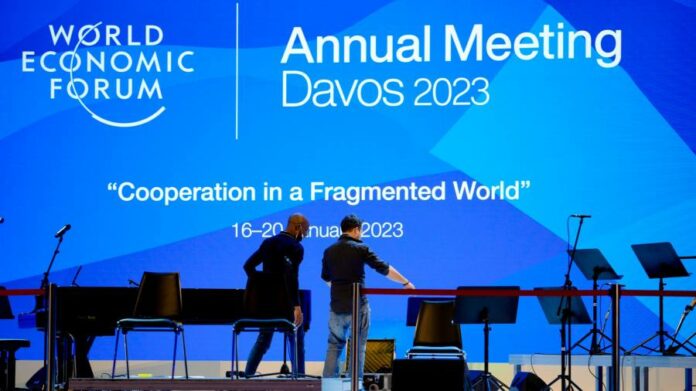This article is an on-site version of our Europe Express newsletter. Sign up here to get the newsletter sent straight to your inbox every weekday and Saturday morning
Good morning. A Russian missile strike this weekend on a residential apartment block in the central Ukrainian city of Dnipro killed at least 30 people, with dozens still unaccounted for.
Moscow’s ongoing brutality will headline the agenda in Davos this week, alongside global trade tensions and climate change, as a chunk of Europe’s ruling elite (and me) gather in the Swiss ski resort. Meanwhile, a few hundred kilometres north, the European parliament convenes in Strasbourg today mired in disrepute over allegations of MEPs for sale.
Up the magic mountain
Davos is no longer the undisputed high table of globalised capitalism, but the love-to-hate-it event retains its allure for many, despite a global landscape described by the organisers as “polycrisis”.
War in Europe, raging inflation and inverting growth, energy shortages, and a trade battle between the US and China (and the EU, for that matter): it’s enough to make any executive vice-president choke on their lukewarm champagne.
As Gideon Rachman notes, this year the World Economic Forum will fret over the end of peace, prosperity and global economic integration, rather than toasting their longevity as usual.
Ukrainian officials will roam the event seeking to secure as much additional financial, military and humanitarian support possible, while scrutinising other delegates for signs of waning commitment to the war — which is lucrative for arms companies but economically debilitating for almost everyone else.
We’ll hear nothing of the sort from European Commission president Ursula von der Leyen, but she will instead provide more detail on her state aid and joint borrowing proposals to hit back against Joe Biden’s €369bn green subsidy bonanza (even if many EU officials think she should first discuss it with them instead of the 600-odd CEOs that have paid for the privilege).
US officials say they are fine with the EU rolling out similar green handouts and don’t fear a subsidy war. As such, the biggest fight over Brussels’ magic money tree will almost certainly be between EU member states.
Europe’s contribution to the Davos roll-call is led by German chancellor Olaf Scholz — the only confirmed G7 leader — and includes the prime ministers of the Netherlands, Poland, Greece, Finland and Spain, plus the Nato and ECB heads.
Many of those will fill their speeches with dire warnings about climate change, fearful that the litany of other global crises is distracting the elite from the biggest one of all.
Indeed, only a sizeable snow dump last week prevented the unseasonably bare green slopes of Davos resembling the world’s most conspicuous advertising campaign for global warming. A relief, too, for the plutocrats that brought skis on their private jets.
Chart du jour: Unequal Union
The EU’s richest 1 per cent pocketed €44 of every €100 created in the bloc between 2020 and 2021, while the bottom 90 per cent shared less than €10, according to a report on global inequality published by Oxfam today.
Dishonourable members
No prizes for guessing what will dominate the European parliament’s plenary in Strasbourg this week, writes our parliament correspondent Alice Hancock.
The Qatargate scandal, involving allegations of sacks of cash gifted to MEPs, has prompted a rush of navel-gazing and a race to reform one of the world’s largest democratically elected bodies.
No formal debate on the topic is tabled but every political group wants to add their two euro cents on what should be done, particularly in the wake of 14 proposals sketched out by president Roberta Metsola last week.
Today Metsola will also announce the start of a process to lift the immunity of two MEPs implicated in the scandal.
By delicious coincidence, the formal proceedings throughout the week will be dominated by debates on democracy and the rule of law, including the EU’s response to protests and executions in Iran and judicial issues in Morocco and Brazil — alongside thoughts from special guest Ulf Kristersson, Sweden’s premier.
On the practical front, parliament is set to vote for a new vice-president to replace socialist MEP Eva Kaili, who is in a Belgian jail, and on whether it should adjust its procedures to allow the European Public Prosecutor’s Office to investigate two members on the management of their parliamentary allowances.
To add to the fun, von der Leyen and European Council president Charles Michel — never confused as best friends — will be jointly grilled on the outcomes of December’s EU leaders’ summit. Bring your popcorn.
What to watch today . . .
-
Eurogroup meeting of single currency finance ministers in Brussels, from 1500.
-
UK foreign secretary James Cleverly and Northern Ireland secretary Chris Heaton-Harris meet European Commission vice-president Maroš Šefčovič to take stock of progress on post-Brexit issues.
. . . and later this week
-
Special address by von der Leyen at Davos on Tuesday at 1115, Scholz delivers his at 1545 on Wednesday. The event runs through Friday.
-
Nato’s Military Committee meets Wednesday and Thursday for in-person strategic discussions.
Now read these
Are you enjoying Europe Express? Sign up here to have it delivered straight to your inbox every workday at 7am CET and on Saturdays at noon CET. Do tell us what you think, we love to hear from you: [email protected]. Keep up with the latest European stories @FT Europe






